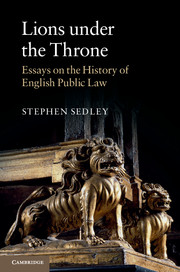Book contents
- Frontmatter
- Epigraph
- Dedication
- Contents
- Preface
- Introduction
- Part I Histories
- 1 Lions in winter: public law in the twentieth century
- 2 The dark satanic mills: the Victorian state
- 3 New corn from old fields: the Hanoverian harvest
- 4 Parchment in the fire: public law in the Interregnum
- 5 The future of public law
- Part II Themes
- Index
4 - Parchment in the fire: public law in the Interregnum
from Part I - Histories
Published online by Cambridge University Press: 05 November 2015
- Frontmatter
- Epigraph
- Dedication
- Contents
- Preface
- Introduction
- Part I Histories
- 1 Lions in winter: public law in the twentieth century
- 2 The dark satanic mills: the Victorian state
- 3 New corn from old fields: the Hanoverian harvest
- 4 Parchment in the fire: public law in the Interregnum
- 5 The future of public law
- Part II Themes
- Index
Summary
Official history has not been generous to the republicans who in the middle years of the seventeenth century defeated the king in a civil war and tried to construct a democracy without a hereditary upper chamber or a monarchy. Their legislation, which has been deleted from the statute book, reveals a series of endeavours to reform the law in ways which it has taken most of the intervening centuries to retrace. It included, in the Instrument of Government 1653, Britain's first and only written constitution, on which the framers of the Bill of Rights twenty-five years later perceptibly drew.
Doing history
If the history you were taught at school is anything like the history I was taught at school, your picture of the mid-seventeenth century probably goes something like this:
In 1642, an army of republicans with cropped heads and round helmets, led by Oliver Cromwell, started a civil war which ended in 1649 with the defeat of the Cavaliers and the execution of King Charles I. The country was taken over by psalm-singing Puritans in tall hats and black cloaks, who closed the theatres, abolished Christmas and made everyone's life a misery until Charles II was restored to the throne in 1660. Not long afterwards, in 1689, the Glorious Revolution gave us a constitutional monarchy.
Or as Sellar and Yeatman immortally recounted it in 1066 and All That:
Charles I was a Cavalier King and therefore had a small pointed beard, long flowing curls, a large, flat, flowing hat and gay attire. The Roundheads, on the other hand, were clean-shaven and wore tall, conical hats, white ties and sombre garments. Under these circumstances a Civil War was inevitable.
When I read for the Bar in the early 1960s, the lecturer who taught legal history stopped when he reached 1649 and moved on directly to 1660 because, he explained, everything that had happened in between was a legal nullity. Using the same airbrush, the definitive edition of the Statutes at Large stops abruptly with the Long Parliament's first year, 1640–1, and resumes on the next page with the first acts of the Restoration parliament in the year 1660, “the twelfth year of the reign of our most gracious sovereign lord Charles the Second”.
- Type
- Chapter
- Information
- Lions under the ThroneEssays on the History of English Public Law, pp. 83 - 106Publisher: Cambridge University PressPrint publication year: 2015



